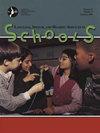Biliterate Adolescents' Writing Skills in a Two-Majority Language Context.
IF 2.9
3区 医学
Q1 AUDIOLOGY & SPEECH-LANGUAGE PATHOLOGY
Language Speech and Hearing Services in Schools
Pub Date : 2025-05-15
DOI:10.1044/2025_lshss-24-00156
引用次数: 0
Abstract
PURPOSE This study examined the writing skills of English-French bilingual (EFbil) adolescents with extensive exposure to both languages in a two-majority language context. METHOD Participants were EFbil adolescents (n = 26) and French near-monolinguals (FL1; n = 12) aged 12 to 17 years. All participants wrote image descriptions in French; EFbil also wrote in English. Between-group comparisons were run for complex syntax, errors, and productivity. Within-group comparisons looked at bilinguals across their languages, and oral and written syntax for both groups. Predictors of text quality were explored through multiple regression analyses. RESULTS In French, both groups performed similarly on productivity and syntactic measures. Bilinguals made more errors, but both groups had a high error-to-productivity ratio. Bilinguals performed similarly in both languages on all measures, except errors that were higher in French. Comparisons between oral and written modalities followed similar patterns for both groups. French exposure and all syntactic measures as well as time spent reading in French were predictive of French text quality. However, a low error-to-productivity ratio best predicted French text quality. CONCLUSIONS Results indicate a similar syntactic performance in French for monolinguals and bilinguals given comparable French school exposure. Being schooled in French did not prevent bilinguals from developing equivalent writing skills in their first language, English. As a majority and globalized language, the environment appears to have allowed bilinguals to maintain sufficient exposure to support their English skills. These results also point to a mutually contributing relationship between the ability to write good content quality and to respect the spelling and grammar of the language.双语青少年在两种语言语境下的写作技巧。
目的:本研究考察了英法双语青少年在两种主要语言环境中广泛接触两种语言的写作技巧。方法研究对象为法语青少年(n = 26)和法语近单语者(FL1;N = 12)年龄在12 - 17岁之间。所有参与者用法语写图片描述;比尔也用英语写作。组间比较是针对复杂的语法、错误和效率进行的。组内比较考察了两组双语者的语言,以及两组人的口头和书面语法。通过多元回归分析探讨文本质量的预测因素。结果在法语方面,两组在生产力和句法方面表现相似。双语者犯的错误更多,但两组人的错误率都很高。双语者在两种语言的所有测试中表现相似,除了法语的错误更高。两组的口头和书面形式的比较遵循相似的模式。法语接触和所有语法测量以及用法语阅读的时间都可以预测法语文本的质量。然而,较低的错误率最能预测法语文本的质量。结论:单语者和双语者在法语学校教育背景相当的情况下,法语句法表现相似。接受法语教育并不妨碍双语者用母语英语发展同等的写作技能。作为一种主流和全球化的语言,环境似乎允许双语者保持足够的接触来支持他们的英语技能。这些结果还表明,写出高质量内容的能力与尊重语言的拼写和语法之间存在相互促进的关系。
本文章由计算机程序翻译,如有差异,请以英文原文为准。
求助全文
约1分钟内获得全文
求助全文
来源期刊

Language Speech and Hearing Services in Schools
Social Sciences-Linguistics and Language
CiteScore
4.40
自引率
12.50%
发文量
165
期刊介绍:
Mission: LSHSS publishes peer-reviewed research and other scholarly articles pertaining to the practice of audiology and speech-language pathology in the schools, focusing on children and adolescents. The journal is an international outlet for clinical research and is designed to promote development and analysis of approaches concerning the delivery of services to the school-aged population. LSHSS seeks to advance evidence-based practice by disseminating the results of new studies as well as providing a forum for critical reviews and meta-analyses of previously published work.
Scope: The broad field of audiology and speech-language pathology as practiced in schools, including aural rehabilitation; augmentative and alternative communication; childhood apraxia of speech; classroom acoustics; cognitive impairment; craniofacial disorders; fluency disorders; hearing-assistive technology; language disorders; literacy disorders including reading, writing, and spelling; motor speech disorders; speech sound disorders; swallowing, dysphagia, and feeding disorders; voice disorders.
 求助内容:
求助内容: 应助结果提醒方式:
应助结果提醒方式:


